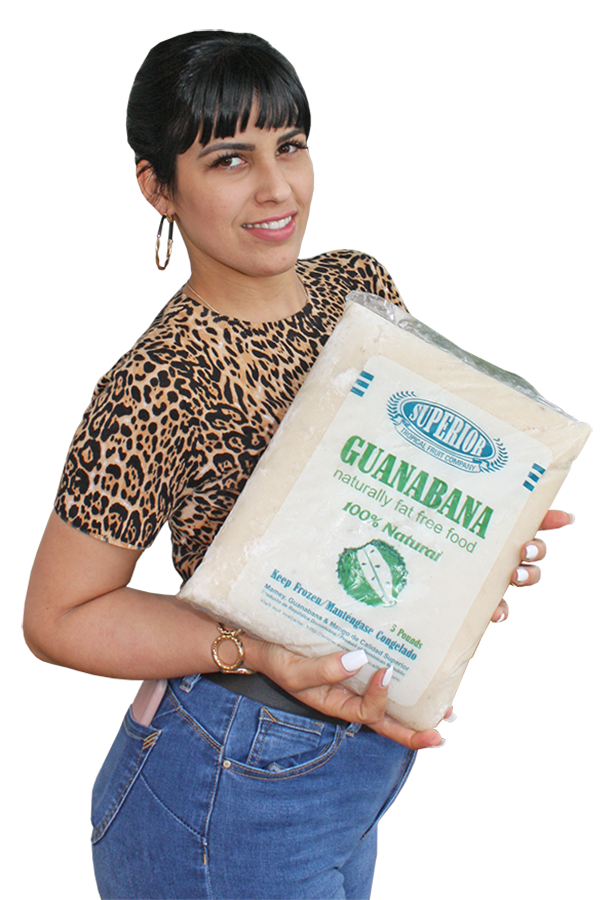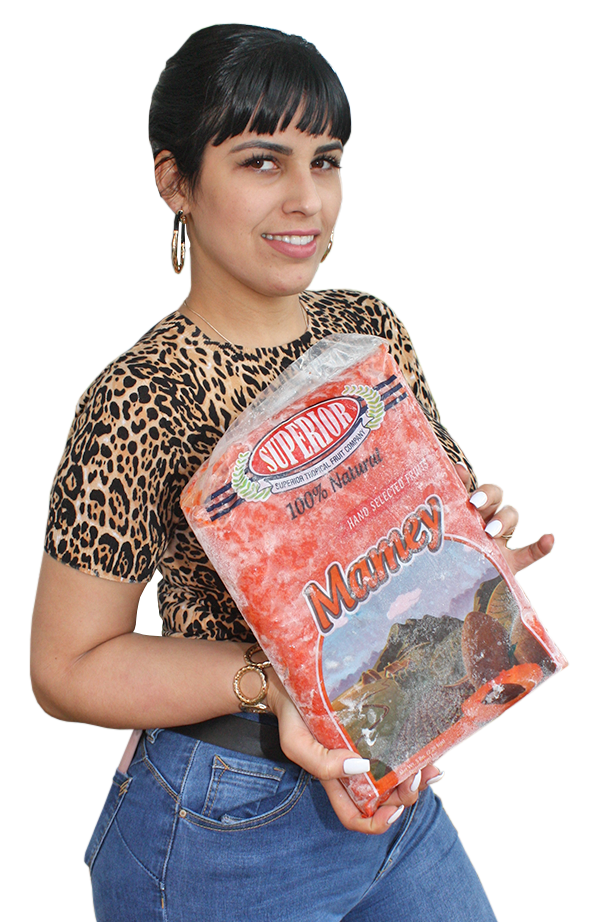
THE GUANABANA IS NUTRITIOUS AND MEDICINAL
The Guanabana is nutritious and medicinal and is excellent for curing cancer. Its pulp is composed mainly of water and contains mineral salts, potassium, phosphorus, iron, calcium, lipids, has a high caloric value due to the presence of carbohydrates, as well as vitamin C, provitamin A and vitamin B.
With the pulp of the fruit juices can be prepared, which is an excellent diuretic. With its leaves and bark tea can be prepared and its powdered seeds serve as an insect repellent. The water from the leaves of the Guanabana is used against lice. The Guanabana is excellent to fight against the flu and decongest the chest.
The green Guanabana is excellent against jaundice (yellowing of the skin, mucous membranes and ocular conjunctiva).

BENEFICIAL AND HEALING PROPERTIES OF THE MAMEY
The mamey is one of the most delicious fruits on the palate, which can be ingested in the form of smoothie and soft drink, especially in the summer.
The taste of its pulp is sweet. Its color is orange. Its seed measures about 10 centimeters and is dark brown or black. Its tone is due to the large amount of carotenes it has, powerful antioxidants that favor the immune system. In addition, mamey is rich in iron and phosphorus.
The word mamey comes from the taino, language from the Antilles before the arrival of the Spaniards and its more exact origin is determined than in Mesoamerica. According to the legend the mamey was ingested next to fermented leaves as a digestive or in infusions to lower the fever.
The mamey can be eaten raw as a fruit, or also in ice cream, liquefied and can be found in jam or jelly.
There are many uses and characteristics of the mamey. One of these is as an aphrodisiac. Its seed in the form of oil (sapayul oil), is also used in beauty products.
This fruit can be found in many tropical countries and all with a different name such as lucuma and sapodilla meat, among others. It is ideal for nutrition, has a large amount of Vitamin B6 and vitamin C, rich in manganese, dietary fiber, potassium, niacin; In addition, it provides a fundamental maintenance for the skin, helps in the growth of the bones, as well as helps and favors the sense of a healthy vision. Avoid cataract problems and loss of vision. Its sodium content as a mineral helps keep blood pressure within limits.
The mamey is a perfect antioxidant to heal wounds, and in the production of collagen for muscles and ligaments, teeth, bones, good blood circulation among other functions and benefits. The mamey is free of fats with many carbohydrates and few proteins.
There are many medicinal properties that are obtained from the mamey. There are innumerable culinary recipes to savor the mamey in different ways, but there are also different not so well known uses such as organic insecticide.
The vitamin C contained in the mamey heals and heals damaged cells in the skin, vitamin A is responsible for rejuvenating the cells, prevents hair loss by keeping it strong, even helps to grow smooth and fine.
Great for digestion; its high fiber content helps fight diarrhea and improve the body’s intestinal traffic; cures bronchitis; Toast and grind the seeds of the mamey will help you with a persistent cough and bronchial congestion.
The mild flavor of its non-acidic pulp makes the stomach tolerate it pleasantly and protects the digestive mucous membranes.
It is ideal to stop the bleeding of wounds due to tannin (substance that is extracted from the bark of trees), contained in its leaves.
It is also a product widely used by cosmetology companies for its vitamins and moisturizing properties. The masks of mamey are used by women to give softness, refresh and care for the skin.

CURATIVE AND BENEFICIAL PROPERTIES OF MANGO
The mango belongs to the family of pistachios, gandarios and cashew nuts. Its name changes from mango to manga and mangou, depending on the region or nation, where it is located.
Mango is native to South Asia (Burma and eastern India), 4,000 years ago. Many stories in Indian mythology mention mango, which symbolizes life, being used in almost all sacred rituals.
The mango plant needs a warm climate, because its flowers and fruits are damaged at temperatures below 40 °.
Mango trees grow up to 65 feet tall. They are also known for their longevity. Some of them live more than 300 years.
The pulp of the mango is similar to that of the peach and is excessively juicy.
Mango can cure diseased stomachs in the same way as papaya or pumice fruit, due to the variety of enzymes it contains.
The mango is rich in fiber and helps prevent constipation.
Studies and studies published in the context of “Comprehensive Reviews of Food Science and Safety” have shown that dietary fibers have a positive effect on the elimination of degenerative diseases, including certain types of cancer and heart disease.
Mango has a high potassium content, but it is very low in saturated fat, cholesterol and sodium. It is also an excellent source of vitamin B, as well as a good source of vitamin A and vitamin C. Mango is rich in minerals such as potassium, magnesium and copper, as well as powerful antioxidants that help neutralize free radicals throughout the body.
The mango tonic is used to treat bleeding gums, anemia, cough, constipation, nausea, fever, dizziness and as a remedy for good digestion.
In addition to the sweet and juicy flavor it also contains a large amount of vitamins, minerals and antioxidants that ensure perfect health.
Mango is a great natural remedy for patients with hypertension. The vitamin E content helps promote sex life by activating the activity of your sex hormones. Mango prevents cancer and has high levels of pectin, a soluble dietary fiber that helps reduce blood cholesterol levels. Pectin can also help you prevent prostate cancer.
Mango cures anemia, because it is rich in iron. Regular and moderate consumption can help eliminate anemia by increasing the red blood cells in the body. Mangos are also very beneficial for pregnant women, since the iron that is needed during pregnancy is extremely important.
Mango contains a high proportion of vitamin A and vitamin C, which contributes to the production of collagen proteins in the body. Collagen protects the blood vessels and the connective tissue of the body, delaying the natural aging process of the skin. Mango has abundant vitamin B6, which is vital to maintain and improve brain function. These vitamins help to fuse the most important neurotransmitters, which contribute to the determination of mood and the change of sleep patterns. The content of glutamic acid in mangoes also improves concentration and memory performance.